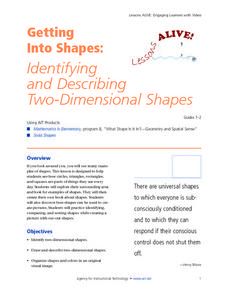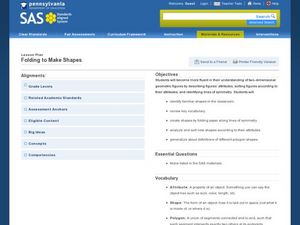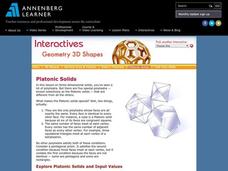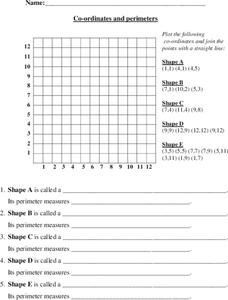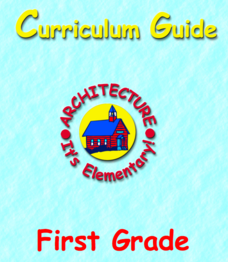Curated OER
Writing lowercase a and d
Printing practice is essential for aiding children in developing motor control and printing skills. They practice printing by tracing and then write the letters a and d several times each.
Curated OER
Great Shapes Alive!
Compare two- and three-dimensional shapes and construct three dimensional models from two-dimensional shapes. Diagram the shapes and reflect about the process in writing.
Curated OER
Castles On The Ground (2D & 3D Shapes)
Explore the relationship between 2D and 3D shapes by having your class view representation of shapes and investigate their symmetry. They will create a solid object from diagrams and describe the reflection or rotational symmetry. In the...
Curated OER
Getting Into Shapes: Identifying and Describing Two-Dimensional Shapes
Young scholars examine their classroom to find examples of various types of shapes. After identifying and describing the various shapes, they draw as many as they can on a piece of paper. They organize them into an image based on their...
Curated OER
Shape Tool
Students explore various polygons and examine how shapes can be manipulated in a variety of ways. In this shape tool lesson, students identify geometric shapes in two dimensions. Students identify and draw one line of symmetry in a...
State of Michigan
Pre-K Mathematics
Kick-start children's education with this pre-school math unit. Offering 31 different hands-on learning activities that develop young mathematicians' pattern and shape recognition, basic number sense, and much more, this is a...
Curated OER
The Very Busy Spider
Youngsters explore visual arts by participating in a geometry identification activity. They read the book The Very Busy Spider and identify the techniques spiders use to create webs. Have you ever noticed that their webs are geometric...
Curated OER
Analyzing 3-D Shapes and 2-D Representations
Students can analyze 3-D objects better with actual physical models and by also drawing 2-D representations of them.
Curated OER
Folding to Make Shapes
Second graders identify different polygons and their attributes. In this geometry lesson, 2nd graders get to know polygons by studying the vocabulary and finding polygons in their classroom. They create these shapes and then find their...
Curated OER
2-D polygons
A hands-on activity uses the Zome modeling system, and helps young geometers either learn or review their knowledge of polygons. Students build as many different 2-dimensional polygons as possible: triangle, square, rectangle, pentagon,...
Annenberg Foundation
Geometry 3D Shapes: Platonic Solids
From polyhedrons to platonic solids, here is a lesson that will have your classes talking! As an introduction to platonic solids, scholars cut and fold nets to create the three-dimensional solids. They use an interactive component to...
Curated OER
Shape Hunt
Young scholars explore two-dimensional and solid shapes. In this shapes and patterns geometry lesson, students work with a partner to create identifiable objects using tangrams. Young scholars describe the attributes of their shape and...
Curated OER
Using R&R to Teach Mathematics
Second graders create a shape garden. In this polygons lesson, 2nd graders practice making shapes using a geoboard and read the book The Greedy Triangle by Marilyn Burns. Students also design a shape garden using construction...
Curated OER
Tiling Tessellations
Students explore tessellations. In this shapes and geometry lesson, students describe the attributes of many of the shapes displayed on an Elmo. Students create examples of tessellations using pattern blocks.
Curated OER
Shapes and Introduction to Geometry
Learners make a quilt. In this geometry lesson, students discuss patchwork quilts and learn some different geometric shapes and patterns that are commonly used. Learners explore designs with triangles and squares and then make their own...
Curated OER
Tantalizing Tessellations Lesson III: Creating a Slide Translation
Students explore tessellations and the artwork of M.C. Escher. They view and discuss a video about M.C. Escher, create a slide template out of cardboard, and create a poster with their tessellation pattern.
Curated OER
Coordinates and Perimeters
Here is a lesson containing a great activity based on coordinates, and the perimeters of shapes created using a given set of coordinates. After youngsters creat a shape on a grid based on some coordinate pairs, they must identify which...
Arizona State University
Roundup Shapes
Let's study 2-D shapes! Young mathematicians compare and classify shapes according to attributes. They evaluate shape riddles and predict the shape being described. Here is the website where you can find the...
Curated OER
Congruent Polygons: Copying Stretchy Shapes
Third graders investigate congruent polygons through dance. In this congruency lesson plan, 3rd graders do the "brain dance" as a warm up. They review polygon names by singing "The Polygon Chant," before mirroring congruent shapes with a...
American Institute of Architects
Architecture: It's Elementary!—First Grade
Build an interest and appreciation for architecture in your young learners with this fun 10-lesson art unit. Engaging children in using their five senses, the class first observes the environment around them, paying...
K-5 Math Teaching Resources
Pattern Blocks
Who needs to buy pattern blocks when you have this printable pattern block template? Including triangles, squares, trapezoids, rhombuses, and hexagons, this resource offers endless possibilities for teaching children about geometric shapes.
CPALMS
2D Rotations of Triangles
Where does the line of rotation need to be to get a cone? Pupils respond to three questions involving rotating a right triangle about different lines. The scholars describe the solid created along with providing details about its...
Curated OER
What a Square
Students examine the painting "Old Man With A Gold Chain" by Rembrandt. They identify geometric shapes in the painting, measure these shapes and compare the relationships of these measurements.
Teachers Network
A World of Symmetry: Math-Geometry
Define and identify the three basic forms of symmetry translation, rotation, and glides with your class. They cut out and arrange paper pattern blocks to illustrate symmetry, create a Cartesian graph, and design a rug with a symmetrical...



